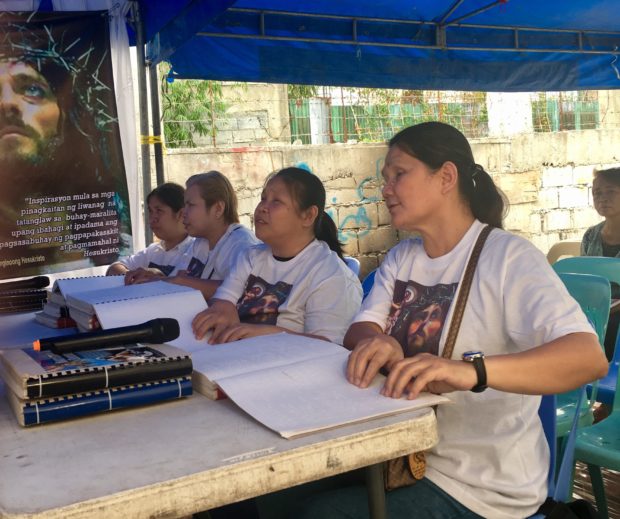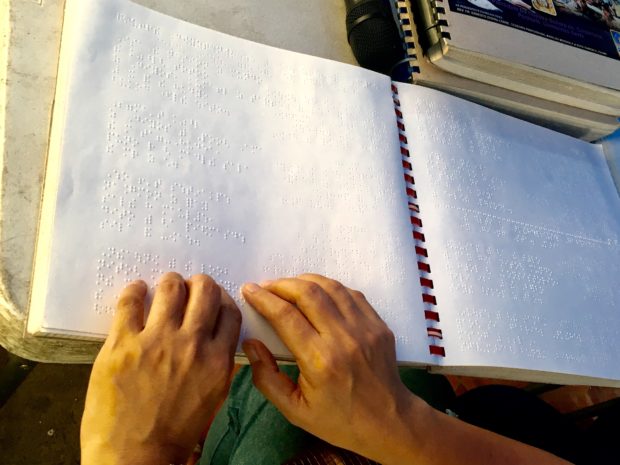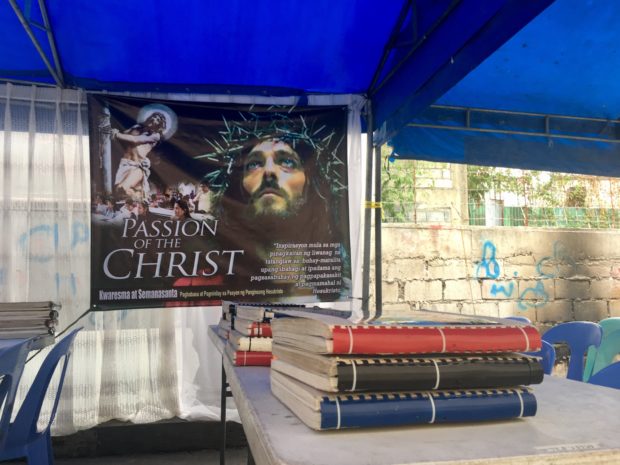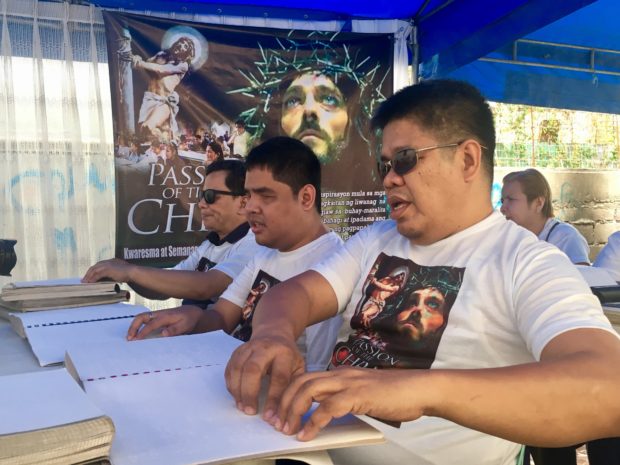Blind devotees inspire with their ‘pabasa’ on Holy Week

SHINING. Nine men and women of Tanglaw Blind Association of Masseurs and Musicians lead the “pabasa” of the Passion of Christ in Las Piñas on Holy Tuesday. Photo by Dexter Cabalza
The “pabasa” (chanting of the Passion of Christ) was easily drowned on Holy Tuesday by noisy children running around, on one side, and a loudspeaker playing pop songs at a party in a nearby house, on the other, in a busy street in Las Piñas.
It’s a new and fresh sight (and hearing) for couple Eduardo and Elvira Palma, who brought their annual reading of the “pasyon” — verses depicting the suffering of Jesus Christ before his crucifixion – from their hometown in Paracale, Camarines Norte to Metro-Manila.
This was not just the Palmas’ vow but also those of their blind friends back in the Bicol region.
Nine members of the Tanglaw Blind Association of Masseurs and Musicians traveled more than 300 kilometers to be an inspiration “from those denied the light that will shine upon the poor to share and feel the reenactment of the life and sacrifices and love of Jesus Christ.”
Tanglaw members have been leading in the pabasa since 2014 in Candelaria church, joined by their sighted believers, every Holy Tuesday.
Article continues after this advertisementThis year, Elvira said the pabasa was brought to their Las Piñas home from Paracale because the Candelaria church was being renovated.
Article continues after this advertisementBraille
Instead of the regular-sized Pasyong Genesis by Mariano Felipe that devotees use, the blind Tanglaw (Torch) members had three volumes of the Tagalog pasyon written in Braille.

Eduardo and Elvira Palma, the pabasa sponsors, brings home their annual devotion to their house on Joshua Street, in Barangay Manuyo Dos, Las Piñas, from Paracale, Camarines Norte. Photo by Dexter Cabalza
It is composed of more than 200 pages, around 5 inches thick, prepared by the group’s leader, Teddy Ponferrada.
“In my hometown in Legazpi, Albay, everyone is participating in the pabasa during Holy Week,” the 59-year-old Ponferrada recalled. “What if we also join them? Blind people can also read if given the right material.”
He manually wrote the Passion in Tagalog Braille and had 10 copies printed in 2012.
The members got their copies of The Passion in Braille in 2013, with the help of the Palmas and Fr. Ernesto Corre Jr., priest of the Candelaria church in Paracale.
Ponferrada, who got blind after contacting cataract when he was 11, said he starts preparing the reading materials as early as Ash Wednesday every year.
Proofreading
One by one, he proofread their books by touching the raised dots in each line of every page. “Just one flat dot and we have a new word all together. ‘Buhay’ may be read ‘bahay’ and that’s not good,” Ponferrada said.

Years of use have flattened the raised dots of their books written in Braille, making them difficult to read. Photo by Dexter Cabalza
Years of use, however, have flattened the raised dots embossed on the pages of special paper.
With one copy of the book no longer readable, Ponferrada noted that only nine of them were reading the Passion this year.
There were also times when some Tanglaw members would stop in the middle of the chanting, only to continue after some harder and longer pressing on the Braille cells on the pages.
“Before we start practicing, I ask them if they could still read the pages of our Passion, and they’ll say ‘pwede pa ‘yan’ (that would do),” said Ponferrada, vice chair of Tanglaw.
Ponferrada was afraid they could no longer chant when their old books would not be readable. He is asking kind-hearted people to help them get copies of the Passion written in Tagalog Braille.
“It has become our annual vow for the blessings we have received. I bear no hard feelings for being blind because I am gifted with a loving family by God,” he said.
For the Palma family, it was curiosity on the capabilities of the Tanglaw members and their resolve to prove a point that made him help them.
“They said they could read the Passion even if they were blind. So I said yes, let’s go ahead,” Eduardo said. “They told me that sacrifice in time for Lent could be done not only by the sighted, but also by blind people like them.”
Elvira added: “People were curious how they were able to do it, bringing in crowds whenever they sing. In the end, they had other people singing with them throughout the night, until afternoon the next day.”
The couple said the Tanglaw members’ pabasa not only strengthened their faith in God, but also gave them miracles.
Miracles
In 2015, one of the Diamond Star buses which they owned met an accident in Tagcayawan, Quezon province, on the way to Samar and Leyte.

Every Ash Wednesday, 59-year-old Teddy Ponferrada, 59, prepares the copies of the “pasyon” written in Tagalog Braille. Each book has three volumes, with more than 200 pages. Photo by Dexter Cabalza
The bus was about to fall into a ravine but was prevented when it crashed into a tree stump instead.
“I believe it is a miracle that the passengers only got light wounds. If it had fallen, all of our 70 passengers would have been killed,” Elvira said.
For Eduardo, the Tanglaw members should serve as an inspiration for their sighted brothers and sisters to continue the tradition of pabasa, especially in urban areas.
“If the blind, even if they’re having a difficult time, were able to participate in the pabasa, then those who have no problems with their eyes should also be able to do it,” he said. “We blind people can also do what others can do. We just need to be given equal opportunities just like our seeing folks.”
WATCH: Members chanting the first parts of The Passion. They read the stanzas through Braille etched on the pages. They will finish the “pabasa” around 3 or 4 a.m. the next day. pic.twitter.com/atbfzFWWh0
— Dexter Cabalza (@dexcabalzaINQ) March 27, 2018
